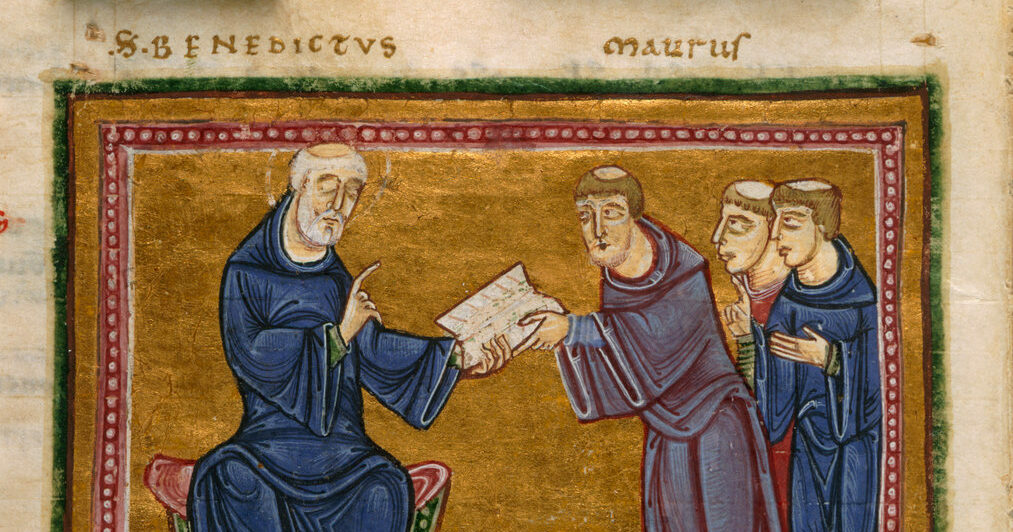By Jason Lane
In his best-selling book, The Benedict Option (Penguin Random House, 2017), Rod Dreher attempts to offer readers a countercultural way of living Christianity in a post-Christian society by following what he calls “the Benedict Option.”
Dreher takes the suggestion of the Catholic philosopher Alasdair MacIntyre, who believed that we must build new forms of Christian communities to safeguard Christianity — while also perhaps preserving western culture and morality, just as Benedict did.[1] Dreher attempts to draw on the wisdom of St. Benedict’s Rule to teach Christians of all denominations how to live countercultural lives in intentional ways, both personally and communally.
Dreher presents the Benedict Option as if it were something new to Christians. In historically broad terms, Dreher declares that Christians have come to a decisive moment in human history requiring us to live drastically, that is, to make decisive and intentional moves in our lives that will change us, our children, the church, and perhaps the world. He writes that his aim in writing the book is
to wake up the church and to encourage it to act to strengthen itself, while there is still time. If we want to survive, we have to return to the roots of our faith, both in thought and in practice. We are going to have to learn habits of the heart forgotten by believers in the West. We are going to have to change our lives, and our approach to life, in radical ways. In short, we are going to have to be the church, without compromise, no matter what it costs.[2]
Dreher is convinced that what was true for Benedict then is true for Christians today. In the face of the moral and spiritual decay of both American society and American churches, Christians must build new forms of sacred communities to defend ourselves and to prepare for a world that is or soon will be godless.
Dreher declares that modern institutions, especially our educational structures, our political and legal structures and basic social structures of family, have been overrun by the liberal left to such an extent that Christians must build new, parallel institutions: new classical schools or homeschool groups, new spiritual communities, businesses, and a recommitment to our churches, the family, and biblical sexuality. Dreher insists not only that we can do it, but that we must, if we hope to endure the rampant corruption of this world.
Dreher’s ‘option’ is simply Christ’s mandate
Lutherans may find the Benedict Option appealing, because it seems to take seriously things that we have always valued: the central place of the Divine Service of Word and Sacrament in the Christian life, the sanctity of marriage and the faithful instruction of children in doctrine and life, a life that is ruled only by faith in the Word of God and is poured out in love for the neighbor through acts of service, the protection of innocence and a clear-headed understanding of being human, and so on. Dreher seems to be urging us to cling to all these things.
The difficulties that many Lutherans will have or, I argue, should have with the book are Dreher’s presuppositions and his conclusions. He thinks that Benedict’s form of Christian living is radically different from what sincere Christians are already doing: receiving the Word and Sacraments and living in but not of the world. Benedict’s instruction for personal piety and the familial bonds of the sacred community, after all, is strikingly similar to New Testament Christianity.
Nathaniel Peters of the Morningside Institute wrote a review of Dreher’s book back in 2017 that I commend to readers of The Lutheran Witness. In it, Peters argues that Dreher’s “Benedict Option” is not exactly optional. The Benedict Option that Dreher describes is a call for us to flee worldliness, to dedicate ourselves and our families to an intentional life of discipleship. In that way, Dreher proposes a way of living, like Benedict, that takes seriously the First Commandment, “You shall have no other gods before Me.” Every Christian knows that our idolatry must be rooted out and, like plucking out an eye to save the rest of the body for the kingdom, it may hurt; it may mean real sacrifice and real hardship in the world. None of this is optional; it’s Christianity. If the Benedict Option is just about “being the church,” then it all hangs on Christ’s mandate and not on Benedict’s option.
The Benedict Option will never save us
Christians of all denominations will find much to praise in Dreher’s prophetic warnings and common-sense critique of our fractured and lonely age. Yet there remains in Dreher’s writing, both in his critique of culture and proposal of the Benedict Option, an element of uncertainty concerning God’s work in this world and His faithfulness to His church. Rather than turn readers to the confidence we can have in God’s promises in Christ, Dreher has a tendency to appeal to the will of individuals and to the resilience of the human spirit to accomplish the task of enduring to the end. Lutherans will find in Dreher a clear call to repentance for our apathy or even capitulation to this world, but they will also find a list of activities for body and soul to work toward reforming ourselves, our families, and our churches. Dreher maintains that the stronger we become in Christian community by decisive commitment, the more prepared we will be to withstand the onslaught of a culture set against God and His Word. He suggests that, with perhaps some intentional effort, Christians can preserve western culture and rebuild what we have lost in the age of smartphones, sexual malevolence, and cultural and moral chaos.
Dreher points to the sexual revolution of the 1960s and the rapid deterioration of human sexuality and marriage since the invention of the internet as watershed moments in American society that have signaled the end of western culture. Dreher believes that the time is right for something radical, because, he is convinced, we are heading into dark ages just as Christians faced at the time of Benedict. His despair is at times palpable. “There are people alive today,” he declares, “who may live to see the effective death of Christianity within our civilization.”[3] For Christians who have come to know God not in visible success in this world, but, as Luther would say, “through suffering and cross,” Dreher’s despair suggests that he was hoping for much more out of this world than it will give. At times his rhetoric will sound to discerning ears like the pursuit of glory, to build a kingdom that cannot be shaken, as if we could with our tent pegs and canvas. But only God can build such a kingdom. He has done it by His cross and He calls each of us: “Pick up yours and follow Me.”
Dreher offers many practical suggestions that may help us in our daily walk as Christians. His suggestion, for instance, to move closer to our congregations makes a lot of sense. As Dreher presents these many suggestions about what we can do to protect our children, parents especially may be tempted either to despair or to pride. Some of us are homeschooling or starting schools or are intentionally involved in our Lutheran schools, others are still involved in our public schools. We may think that we are on the road to success, only to find out that we’re raising real sinners and that we, too, are apt to think that our right method or option produces the right results every time. Experience will teach us otherwise.
Readers may question whether the motivation of this book is fear of the world or confidence in God’s mercy in Christ for it. Dreher wants to say in a tone of prophetic warning and evangelical counsel that it is both. On a practical level, his suggestions are certainly Christian. We should be involved in our churches and rejoice in God’s Word and Sacraments. We should sing hymns together and pray for one another. We should offer our children a superior alternative to this world’s cheap show and create a real culture of life, full and rich. Furthermore, he’s right. Parents shouldn’t get divorced. Children don’t need smartphones. Pornography corrupts. And, yes, many of us parents are going to have to find better options for schooling, if the schools are teaching our children lies.
His critique is correct and many of his suggestions are helpful, and yet his approach lacks confidence in Christ, and therefore directs Christians — unintentionally, I think — to their own efforts and works. Of greater concern for LCMS Lutherans is Dreher’s subtle suggestion that you can do it. His road map for Christians appeals to the pharisee in all of us, because he invites us to look at what we are doing. If he intends this to be in any way comforting to Christians, to the kind of Christians who not only have to deal with the mindless assaults of a godless generation but who also contend daily with their own sin and weakness, this is a dreadful confusion of Law and Gospel. Dreher has a lot to say about the Law, but he offers a strange gospel that is really no Gospel at all. The Benedict Option begins and ends with works, good works to be sure, but works all the same. And works are bound to cause in us either despair or pride: despair when we realize that we can never do enough what God (not Dreher) commands, and pride when we think that we are doing enough for God because “We’re doing the Benedict Option!”
What Christians need more than a Benedict Option is to believe in the Lord Jesus Christ who on His way to the cross to pay for our sins promised: “In the world you will have tribulation. But take heart; I have overcome the world” (John 16:33).
[1] Alasdair MacIntyre, After Virtue (Notre Dame, IN: University Notre Dame Press, 2007), 263.
[2] Rod Dreher, The Benedict Option: A Strategy for Christians in a Post-Christian Nation (New York: Penguin Random House, 2017), 3.
[3]Dreher, Benedict Option, 8.
Cover image: “St. Benedict delivering his Rule,” France [Monastery of St. Gilles, Nimes], 1129, Courtesy British Library.






Dreher is a theologian of glory and so, to quote Lennon, paraphrasing (unintentionally? maybe) Luther, “misunderstanding all he sees.”
I think The Benedict Option and Dreher’s more recent book “Live Not By Lies” are worth a read. My main takeaway from The Benedict Option was to physically relocate to a strong religious community and then bind your family to that culture.
“Strengthening families and communities, and thickening our ties to each other and to our churches.”
Pursuing this option would be a very intentional, purposeful, physical move to tie a person closer to their church and lessen the chance of falling away from their faith. Then, “Raise your kids to know that your family is different – and don’t apologize for it… It’s about imbuing kids with the conviction that there are some things that people in our family just do not do- and that’s okay.” That is all more easily accomplished if you’re embedded with like-minded people.
He goes a little further into “society is crumbling… be prepared” territory with Live Not By Lies. It’s almost a book for preppers concerned about an authoritarian government overtaking America. “Christians should educate themselves about the mechanics of running underground cells and networks while they are still free to do so.” And on a more basic small community or family level, “Leaders of small groups must be willing and able to carry out catechetical ministerial, and organizational roles normally performed by institutional church leaders who may be unable to do so under the law.”
Scared yet?
I looked at all of this from the potential receiving end of folks interested in escaping their challenging communities and relocating to like-minded towns. I live in a rural county in Kansas that is in the top five in the nation of LCMS adherents per capita. A few of us from our church have wondered what it would take to further enhance our status as a “Lutheran Redoubt” for anyone who would like to be totally surrounded by fellow Lutherans. We are very rural, but our Lutheranism is a unique and special reason to live here and raise our family here.
Maybe this is why I read Dreher’s book the way I did… I wouldn’t necessarily need to relocate to a church community, because I’m already surrounded by my church community. But maybe amplifying the joy of our Lutheran faith is something on which we could focus. He provided some narratives I could use.
Although I have not yet read,”The Benedict Option,” by Rod Dreher, I found this review very noteworthy. At present, I have at least two books to read before going forward with Mr Dreher’s work. I think Rev Lane’s commentary is excellent. I wish this book was written twenty years ago, and furthermore, I believe that too few American pastors have given his insights due credit. The reality is that the Western churches allowed heresy and apostasy, and legions of false teachers, to take over the narrative in the culture wars, and sadly, in the moral and spiritual as well. The churches allowed festering tumors to grow into a mass, instead of carrying on the task of exposing the truth, albeit the unpopular truth, and now surgical correction is not forthcoming, unless it is by the hand of God. We should remember there is nothing new or unique about the present Post Christian mindset we see today. In many respects, it has been a trial, and a testing, where the Lord purges His people and the result is a pruning of branches, both churches and people, and however small the result, how barren the tree, it will be the strength of the vine (Christ) which holds the remaining remnant. We see these depressing changes in our society, and yet we cannot be surprised or anxious, but rather we should view them soberly and humbly. God is still working. Pruning the branches is something He does. Let us hope we ourselves remain faithful during this painful process. Soli Deo Gloria